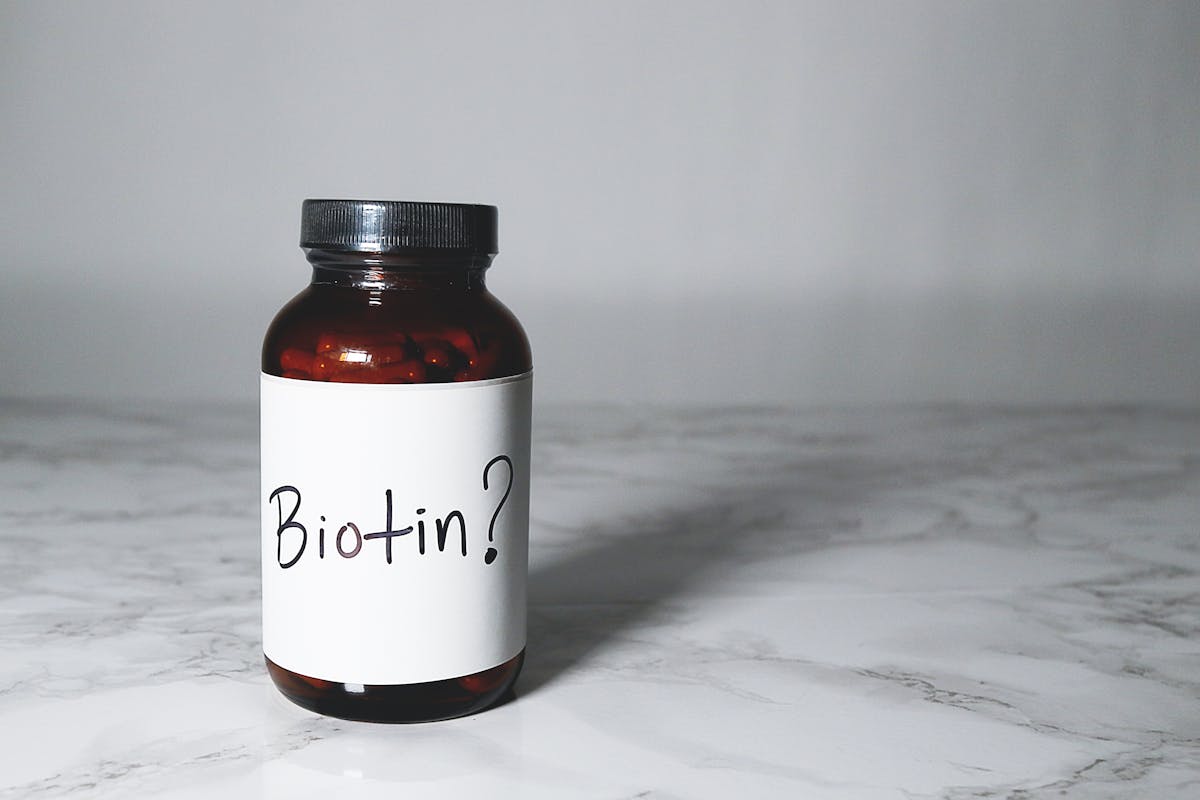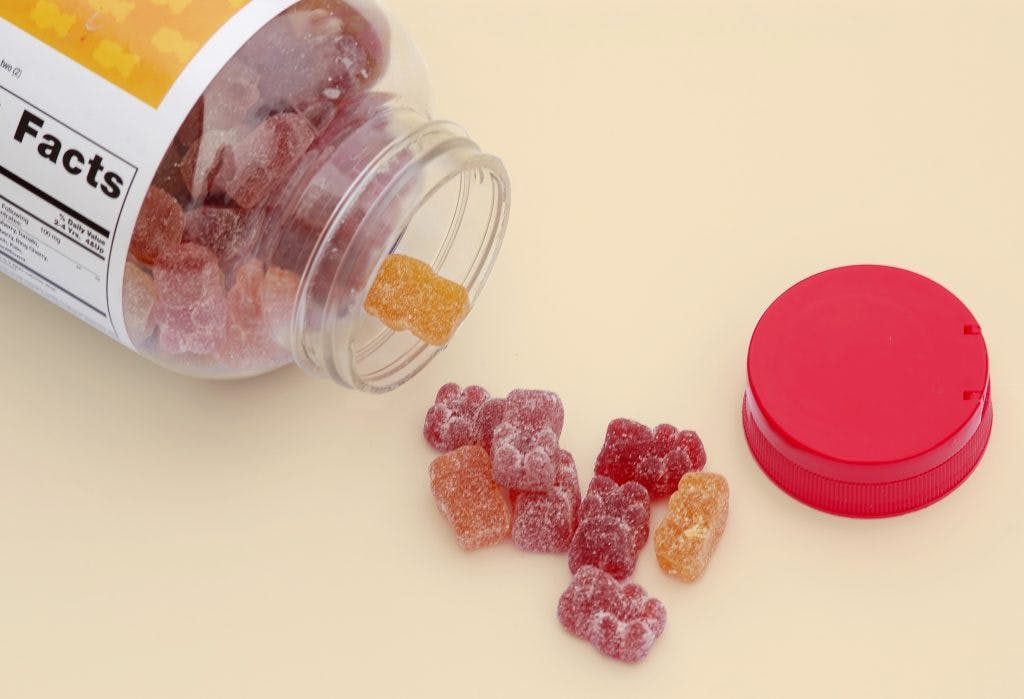When considering a supplement to support hair growth, a common go-to in people’s minds is just straight biotin, aka vitamin H or vitamin B7.
5 Reasons Many Biotin Products Are A Waste Of Money
Hair Health
13 Min Read

Get hair, health, and science news delivered right to your inbox.

Medically Reviewed by
DR. TESS MARSHALL, N NDBut is biotin for hair loss really a one-stop shop? The answer is murky — and it’s made even murkier by deceptive marketing and psuedo-scientific internet articles. While it’s no secret that biotin plays a role in aiding hair growth and strength by supporting cellular energy, processing of glucose, and metabolizing proteins, the majority of people will not reach their hair goals by taking biotin supplements alone.
So what does biotin do? Who is it for? And can too much biotin be a bad thing? Keep scrolling for the five reasons biotin products may be a waste of your money.
1. Biotin deficiency is rare
Yes, it’s true that those with an actual biotin deficiency experience hair loss, brittle nails, and even dermatitis (irritation of the skin primarily on the face). But it turns out this nutrient deficiency is quite rare. Found in many dietary sources, such as fish, almonds, organ meats, eggs, and sweet potatoes, biotin is generally obtained in sufficient amounts within the typical Western diet. Additionally, some of the bacteria found in one’s gut is actually able to produce a bit of biotin as well.
That being said, biotin deficiency can occur in some people: it can be found in some inherited conditions and can definitely be acquired as well. One acquired reason can be an excessive intake of raw egg whites. (“Raw” is the key word here, as raw egg whites contain avidin, a protein which binds to biotin and disables it.) Other examples of acquired causes can stem from abnormalities within the gastrointestinal system, including malabsorptive disorders and common lifestyle practices like binge drinking. Under these circumstances, biotin’s utilization for disorders regarding hair has been noted, which is probably where this vitamin gained its popularity and association with hair loss.
2. Some supplements have too much biotin
Living in a super-size-me world where the general culture feels “more is better” certainly should not apply to biotin. Individuals who are taking biotin for hair loss in lesser doses and not seeing the desired results often assume their dose must not be enough and, in turn, take too much biotin.
As stores sell biotin in doses up to 10,000mcg per serving — which is a very high amount based on the daily value of only 30mcg — many believe that more will be the “magic bullet” to combat hair loss and buy a dose with too much biotin. Meanwhile, there is not sufficient evidence to support this notion.
3. Your doctor may prescribe against it
Currently, there isn’t an upper limit of biotin noted from the Food & Drug Administration (FDA). Biotin is a water-soluble vitamin, meaning it is not stored by the body for long before it’s eliminated through the kidneys. This basically means it’s not going to harm the body, but, in mega doses, it may mess with some lab results.
In fact, the FDA recently updated its safety communication that too much biotin could interfere with laboratory tests such as troponin, a significant cardiovascular marker. Another observation of biotin potentially interfering with thyroid function tests has been surveyed in both adults and children. One case report observed four different individuals whose thyroid function tests demonstrated an incorrect thyroid diagnosis after having taken 20-30 mg (20,000-30,000 mcg) of biotin for various lengths of time. This further suggests that taking 20mg or more of biotin could interfere with clinically relevant thyroid labs.
As high levels of biotin have been noted to alter labs, it is important to inform your doctors of all medications and supplements (including the dosages) you are taking, so they can factor this in and make appropriate recommendations before ordering tests.
4. Most biotin products are not even healthy

Biotin gummies are are chewable, easy to take, and often taste like candy. However, these gummies have a fair amount of sugar in them, thus taking away from the supposed health aspect of the biotin product. Plus, they’re usually dyed with artificial colors and flavorings that contain starch and gluten.
The importance of reading labels cannot be emphasized enough. When it comes to healthy hair, having balanced blood sugar levels is important, as it is a contributing factor in supporting a healthy hormone production. (Blood sugar problems can mean more follicle-disrupting DHT — no thanks). Too much sugar — not to mention body-disrupting food additives — can also stimulate inflammatory processes in the body, which can be another component related to compromised hair growth.
5. There is no substantiated proof that taking biotin alone helps with hair loss
This is not to say that biotin does not have a place in supporting healthy hair, but why just “hang your hat” on one vitamin? Biotin is an important cofactor for many metabolic processes and pathways in the human body, including fatty acid production, gluconeogenesis (making glucose from a source other than carbohydrates), and amino acid (the building blocks of protein) metabolism. But on a molecular and physiological level, it has been observed that the possible benefits from supplementing with biotin do not result in any improvement on the development or growth of hair. Period.
Further, the effects of biotin supplementation appear to have fairly limited information concerning the improvement of hair growth when a deficiency is absent all together. (And, as mentioned above, biotin deficiencies are extremely rare.) This evidence is coming from a comprehensive review of the medical literature by board certified dermatologists dating all the way back into the 1980s! Thank you Drs. Soleymani, Sicco, and Shapiro for bringing this to light and educating the masses so better and more effective choices can be made when searching for a hair supplement.
The real deal about biotin
So we’ve now identified that biotin for hair thinning shows limited success when used on its own. However, in clinical trials where biotin was used in combination therapy with other vitamins and botanical extracts, there have been positive results.
“Supplements containing proper doses of vitamins like biotin, along with ashwagandha, tocotrienols, curcumin, and saw palmetto, have shown clinical efficacy and are gaining popularity for use in healthy hair growth,” says Valerie D. Callender, MD, a dermatologist who recommends Nutrafol to patients looking for a drug-free hair supplement with the right blend of biotin and other potent nutraceuticals.
Because hair thinning can be triggered by everything from stress to hormones to nutrition, it requires a multi-targeted solution. With formulations for men, women, and women experiencing menopause, Nutrafol addresses the root causes of hair thinning with ingredients clinically proven to improve hair growth. Most Nutrafol users notice results within 3 to 6 months. They also report better sleep, reduced stress, and even clearer skin, thanks to ingredients like ashwagandha, circumin, and marine collagen.
When it comes down to it, biotin supplementation as a stand-alone support for hair growth is not the answer. Again, that’s not to say biotin has no place in the mechanisms of hair health, but for many, it’s probably not the silver bullet it’s been made out to be. A multi-targeted approach combining vitamins, minerals, and botanical nutraceuticals is a more efficacious treatment for poor hair health.